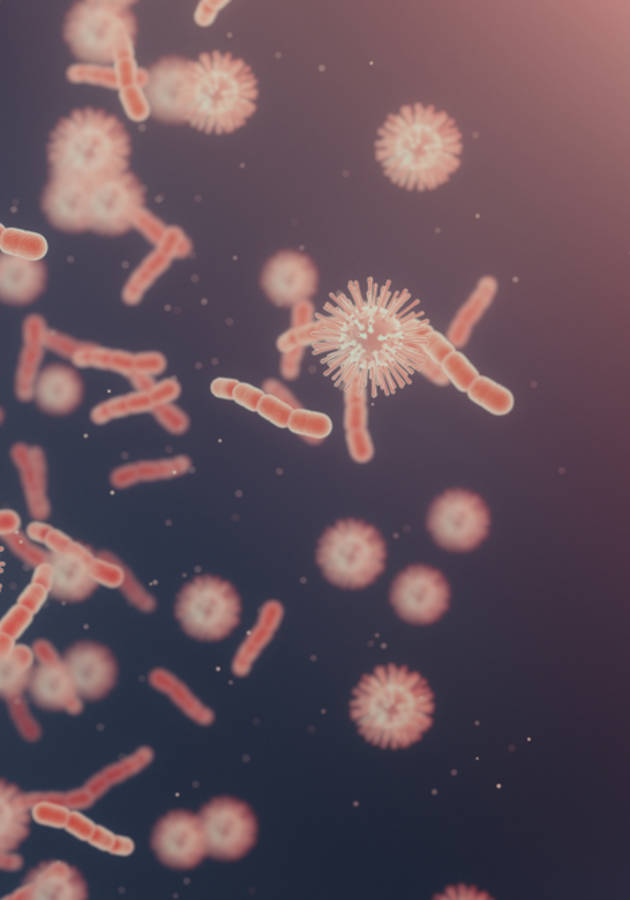A recent study by the American Medical Association found that stress is an important factor in 75% of all illnesses and diseases that people suffer from today. According to the Harvard Medical School’s Mind-Body Institute, that number may be bigger, much bigger. In fact, their meta-analysis has recently shown that a whopping 98% of all mental, physical, and behavioral illnesses are in some way connected to one’s thought life. The flip side to this staggering statistic – writes Dr. Caroline Leaf in “Switch on Your Brain” – is that only 2% to 25% of the diseases that plague us come from the environment and the genes. In other words, we are victims neither of our biology nor our upbringing, but toxic thinking patterns.
But that’s good news! Because it suggests that by changing our own thinking, we can change everything, including our health, life and destiny. Up until a few decades ago, scientists considered this not merely a bold claim, but a pseudomedical one as well. Nowadays, however, we know that the brain is plastic and that it changes and adapts constantly, sometimes in response to our very thoughts. In “Switch on Your Brain,” Leaf – a life-long student of both medicine and the Bible – explains through science and Scripture the logic and soundness of this concept. So, get ready to discover why your mind is the most powerful thing in the universe after God and how you can use it to change your brain and your life as well!
Mind controls matter
The mind-body debate is as old as modern philosophy and ever since its very beginnings, it has produced two prominent lines of thought. The first one is that of the materialists. Materialists believe that it is the chemicals and neurons of the body – or, more particularly, the brain – that determine all aspects of our lives, creating both our thoughts and our actions. For materialists, even complex feelings, such as love and jealousy, are not abstract, immaterial phenomena. They are, instead, the predictable upshot of a few chemicals racing around one’s body on the orders of their brain which, in turn, secrets them under certain circumstances and conditions. Consequently, materialists don’t think mental disorders such as depression or other psychoses can be cured with words of love and comfort, but only with the appropriate pills. All illnesses, for materialists, are essentially chemical imbalances; all treatments consist of adding in the missing chemicals.
According to Dr. Caroline Leaf, this view is “biblically and scientifically incorrect.” Namely, the mind isn’t what the brain does, but the other way around – it is the brain that does the bidding of the mind. Stated otherwise, it is not the chemicals inside you that produce your thoughts and illnesses but rather it is the thoughts you’re thinking that produce the chemicals inside you which, in turn, change your brain and your body. “Our mind is designed to control the body, of which the brain is a part, not the other way around,” writes Leaf. “Matter does not control us; we control matter through our thinking and choosing. We cannot control the events and circumstances of life but we can control our reactions. In fact, we can control our reactions to anything, and in doing so, we change our brains.”
This is not a new idea. In fact, it is older than materialism. In philosophy, it is known as dualism because it proposes that mind and body are two different kinds of entities. Dualists also claim that minds, since they are not made out of physical stuff, are also not subject to the laws of nature. Modern neuroscientists, such as Marian Diamond, Norman Doidge, and Joe Dispenza, are – and forgive us the pun – of the same mind. Ironically, implies Leaf, that means that science is finally catching up with the truths of the Bible wherein the prophets use a slightly different term for “mind” – namely, “soul.” Their advice, however, can’t be more straightforward. Consider Proverbs 23:7 for one: “As he thinks in his heart, so is he.” Indeed, we now know, internal activity in your mind is where everything begins.
Choice and your multiple-perspective advantage
Just type in “is free will an illusion?” in the search bar of your browser and you’ll see a seemingly endless list of articles by respected publications claiming it is. However, delve a bit deeper and you’ll see that many of the experiments which seemingly support this claim are, at best, inconclusive. For Leaf, it is plain wrong because it isn’t supported by the Bible. “I am a scientist,” she writes, “and if I can’t back up a scientific ‘fact’ with Scripture, I question its validity.” In this case, you don’t need to go beyond the first few chapters of Genesis to see that even Adam and Eve had free will. But how can one reconcile that crucial biblical episode with Benjamin Libet’s unambiguous identification of brain activity in the prefrontal cortex a whole seven to ten seconds before an actual decision was verbalized or enacted by the subjects of his famous 1983 study?
Well, says Leaf, it’s not that difficult. The brain activity identified by Libet was actually processing activity done by the nonconscious part of our brain using the thoughts we have implanted there over time. Put in simpler terms, “what we say and do is based on what we have already built into our minds.” So, it is not really a combination of chemicals that prepares us for an upcoming decision ten seconds before that decision enters our awareness, but “nonconscious intellectualizing” driven by memorized thought patterns. Rather than being driven by unknown forces, we are the drivers and are accountable, not only for every thought and decision we make, but also for the ones we’ve made in the past. “Free will is not an illusion,” Leaf concludes assertively. “Thinking it is an illusion is dangerous thinking, and it basically says that we are not responsible for our actions, thus providing an excuse to do whatever we want to do, with no consequences.”
In fact, researchers have found that people who doubt free will are more dishonest than people who believe in choice and self-determination. More importantly, they have also found that the intricate structure of the frontal lobes in humans allows us to both think and think about thinking. The latter is another proof in favor of the existence of free will. If one has the equipment to observe their thoughts and actions, one also has the ability to make decisions about them. Humans are the only ones who have this ability. They are also the only ones who can make a decision after looking at things from widely different, imaginary perspectives. Leaf calls this “multiple-perspective advantage,” or MPA for short. And she says it’s a gift from God that we need to accept through faith.
Epigenetics, your choices and your brain
“Do not conform to the pattern of this world, but be transformed by the renewing of your mind. Then you will be able to test and approve what God's will is – his good, pleasing and perfect will.” These are the words that the imprisoned St. Paul wrote to the Romans in the second verse of the twelfth chapter of his famous epistle. Even as Leaf was taught by her university teachers that the functions of the brain cannot be restored, she found great comfort and solace in these words. She knew they must be true. Today, she knows why, firmly believing that “a time is coming when medical practitioners will include […] Romans 12:2 on their prescription pads.”
It all has to do with epigenetics, justly called by one neurologist “the science of rewriting your genetic destiny.” Even though it’s often called “a new science,” in the words of Leaf, it’s pretty much as old as the world since we can find its core tenets throughout many of the Bible’s. In essence, epigenetics – as its name implies – is the study of how factors outside of our genetic code can alter the expression of our genes, switching them on and off. Your body, in other words, is capable of changing much more than scientists believed until just recently. In fact, we now know for sure that the way we live our lives has a direct and significant impact on how our genes are expressed and manifested.
And it all goes all the way up to our thoughts. They determine our choices, which, in turn, determine both our actions and our health by getting “under the skin” of our DNA. This is not an exaggeration, but a scientific fact, one of the most liberating you’ll ever hear! Leaf explains why quite poetically: “Our thoughts, imagination, and choices can change the structure and function of our brains on every level: molecular, genetic, epigenetic, cellular, structural, neurochemical, and electromagnetic, and even subatomic. Through our thoughts, we can be our own brain surgeons as we make choices that change the circuits in our brain. We are designed to do our own brain surgery.”
But wait, there’s more! You see, epigenetics researchers have discovered that some of the genetic information produced through our thoughts and choices can also be passed on to the following generations. That does mean that – as the Bible claims – we are all destined to inherit the negative genetic patterns of our ancestors. However, it doesn’t mean that we are destined to live them out. On the contrary, we can overcome them by tweaking their expression with our thoughts. Let’s see how!
The five steps of the 21-day Brain Detox Plan
Based on “rigorous science and the Word of God” Leaf’s trademarked 5-Step Switch On Your Brain Learning Process – or even better known as the 21-Day Brain Detox Plan – is a simple tool that should help you change your thinking for the better and, in doing so, change your life for the best. It is designed to produce “focused, organized, and disciplined deep intellectual thinking to break down toxic thoughts and build up healthy thoughts.” Most importantly, it’s compatible with anyone’s life, no matter how dynamic and hectic, since its routines take about 7-10 minutes a day for a period of 21 days. Since a year has 365 days, that means you can do up to seventeen 21-Day Brain Detox Plan cycles per year. In fact, you should, because after renewing your mind, you must also keep it renewed and that is, arguably, more difficult. The five steps of Leaf’s 21-day Brain Detox Plan are:
- Gather. The gather step is about “becoming aware of all the signals that are coming into your mind from the external environment through the five senses and understanding the internal environment of your mind.” During this step, take just one or two minutes to identify a toxic thought pattern and consciously think of a replacement thought. Use the Bible for inspiration.
- Focused reflection. If the purpose of the gather step is to bring your nonconscious thoughts into consciousness, the purpose of the reflection step is to loosen up “the branches” of the respective thought tree. Simultaneously, it is about growing and integrating healthy branches by reflecting on the positive immediately after dwelling on the negative. Reserve 1-2 minutes for each.
- Write. In the third step, it’s time to write down your thoughts to add some clarity to their expression. In the breaking-down part of this step, your goal should be to start shaking the branches of toxic thinking to loosen up the glue. In the building-up part, you should consciously try to add some more information and, even more importantly, links with other branches by writing the positive alongside the negative.
- Revisit. Revisiting what you have written is “a progressive moving-forward step,” the first of the two in which you will be doing the same thing in both the breaking-down and building-up process. The purpose of this step is to shift the glue from the toxic branches to a new, healthy thought, thereby replacing a toxic thought with a healthy one. There are many ways to achieve this, but perhaps the best one is to look yourself in the mirror while reading your toxic thoughts and say a short prayer or a positive phrase. You can also try gently tapping your heart three times while thinking of the replacement thought. Either activity takes just a few seconds but its effects are long-lasting.
- Active reach. The purpose of the final step is to melt down the old branches and actively strengthen the new ones. To achieve this, set your alarm for every two hours of your waking day and use the reminder to think of the replacement thought for a few seconds, or at least until the adjoining toxic one gets muted inside your brain for the moment. Don’t worry if it returns in the meantime: just go on repeating these steps for 21 days and the toxic thought will completely disappear. After all, as they say, what you starve will die off and what you feed will grow. That’s essentially the 21-Day Brain Detox Plan in a nutshell!
Final notes
Lauding Dr. Caroline Leaf for being able to translate modern brain science into language accessible to everyone, neurosurgeon David I. Levy describes “Switch On Your Brain” as “a delight” and recommends it to everyone interested in improving their joy and mental health. James Robinson, president of LIFE Outreach International, concurs, believing that Leaf is a rare breed – someone able to connect the dots between science and Scripture with such firmness and clarity. A few will ever dispute that. Not a few, however, might dispute some of Leaf’s scientific conclusions and her insistence on the veracity and reliability of the Bible. If you are a Christian, however, you’ll find a lot to like and enjoy here.
12min tip
You are not a victim of your biology or your life’s circumstances. You can control both your thoughts and your reactions and, through them, your life and destiny. You do have a choice. Make the right one.





























